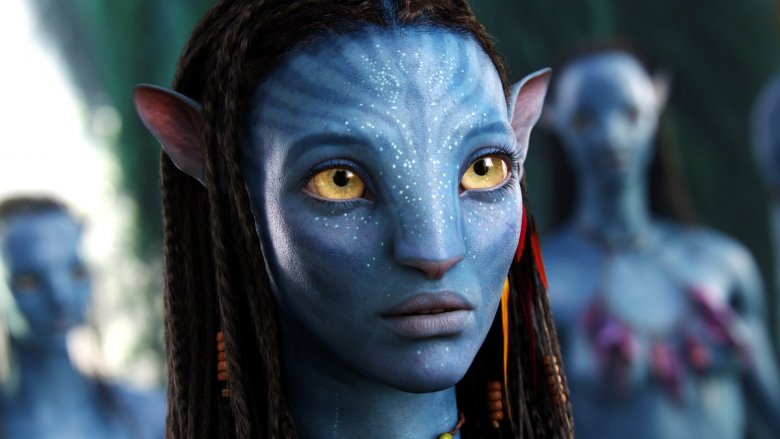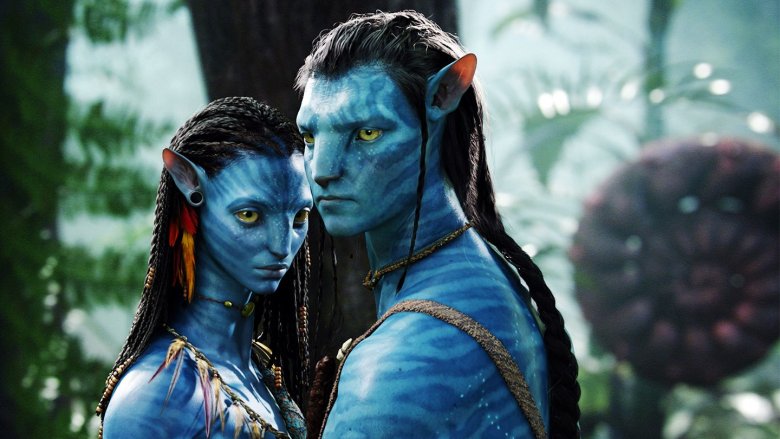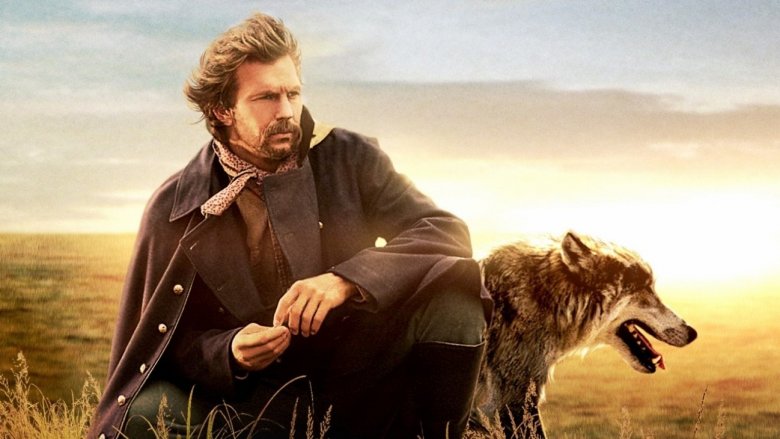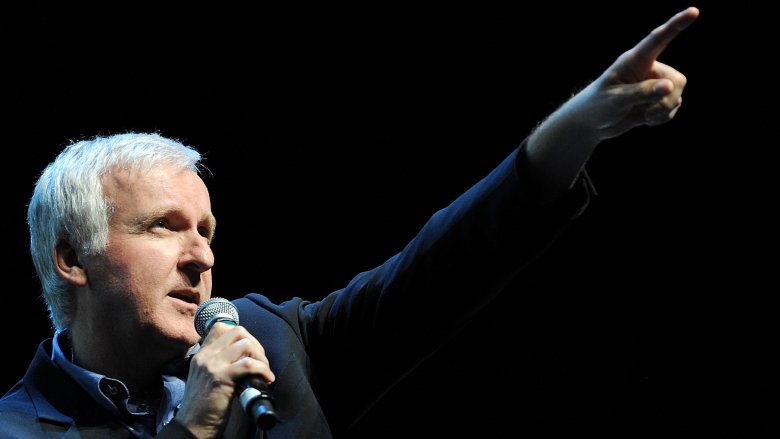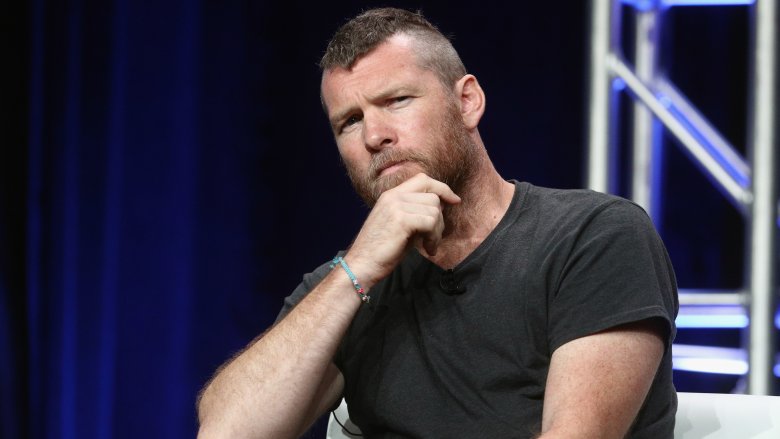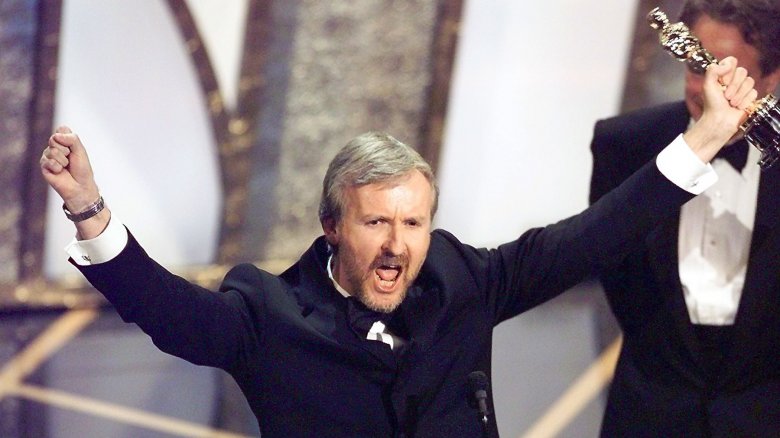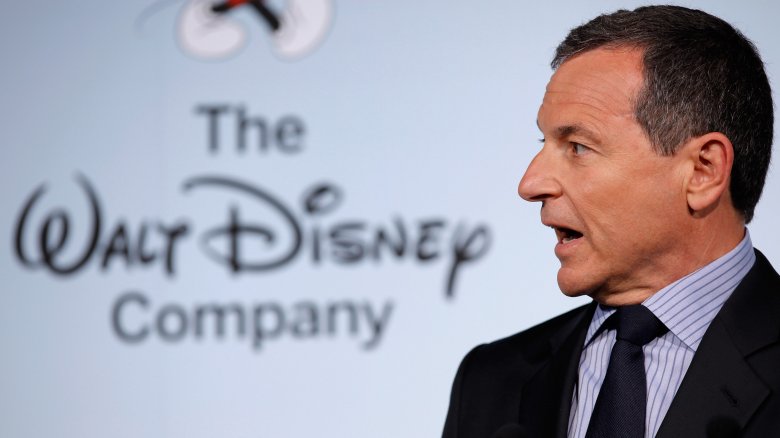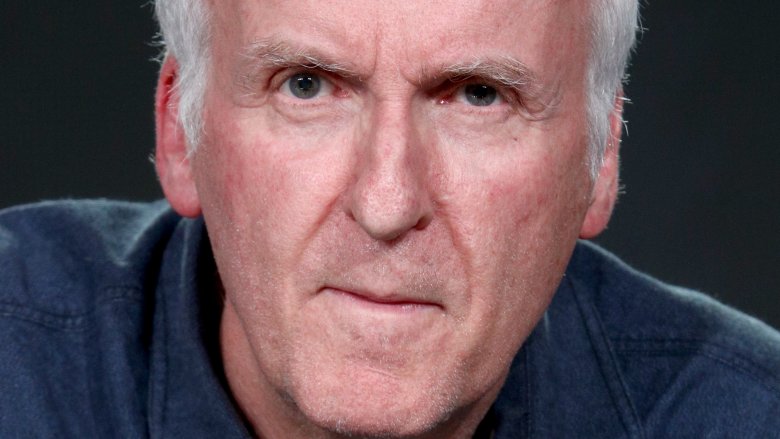Why We're Worried About Avatar 2
Released in 2009, James Cameron's Avatar is far and away the highest-grossing film of all time, and even with the revival of the Star Wars films and the ridiculous string of blockbuster hits being churned out by Marvel Studios, it's not likely to lose the title soon — if ever. Only Cameron's previous effort Titanic ($2.1 billion worldwide) and Star Wars: The Force Awakens ($2.06 billion) have even come within shouting distance of Avatar's staggering $2.7 billion run. Yet there seems to be no rush getting the obligatory sequels into theaters.
Last year, release dates were finally announced for the next films in Cameron's planned series, with Avatar 2 hitting screens on December 18, 2020. But if that bit of news slipped by you, it may be because the public's appetite for a continuation of Avatar's story may not be as ravenous as Cameron thinks — and because one massively successful film, even the most successful ever, may not necessarily translate to an equally successful franchise. Here's why we're more than a little concerned about Avatar 2.
It's been over ten years since the original
Extremely belated sequels can sometimes work, but it's a tricky proposition. Blade Runner 2049 is a recent illustration of how it can go right creatively, but in general, today's audiences — accustomed as they are to the big-budget serialized storytelling of the Star Wars and Marvel franchises — have a relatively short attention span, usually having to wait no longer than a year or so for the next installment of their favorite franchise.
For the sake of illustration, consider that in 2009, the Marvel Cinematic Universe was all of one year old. By the time Avatar 2 hits screens in 2020, the MCU will have an astonishing portfolio of 20 features in the 11 years since Avatar became the box office champ, and that film has produced scant few multimedia spin-offs — video games, novels, television projects and the like — to keep our interest high. It's also never a good sign when a film's production schedule is pushed back multiple times, as has been the case with Avatar 2, which was originally slated for release in 2014 before being pushed back to 2018, and finally 2020. This may not be reason for concern if Avatar were the type of cultural juggernaut that Marvel has become — but as anyone with the slightest interest in pop culture over the last decade can tell you, it simply isn't.
Avatar left no cultural impression
It's easy to forget that the vast majority of the hype surrounding Avatar leading up to its release had to do not with a groundbreaking story or amazing cast, but the technology involved. It was posited as the first movie to treat 3D not as a gimmick, but as a serious storytelling tool — and speculation about the film prior to its release focused largely on the brand new 3D technology and insanely detailed CGI that the film would employ. It promised a whole new technological world of filmmaking, and it largely delivered. But in doing so, it may have failed to give audiences a story and characters that they could connect with.
This is evidenced by the fact that in the years since its release, Avatar simply hasn't become the kind of cultural phenomenon that one would expect from a movie that outgrossed every single Star Wars film. The one detail that seems to have lodged in the public consciousness is "big blue cat people having weird sex"; none of the characters have become cultural icons a la Luke Skywalker or Iron Man (and many moviegoers would be hard-pressed to name one), and when it comes to sales of tie-in merchandise, Avatar isn't even in the top ten. Indeed, the film seems to have become diminished in the popular consciousness in a way that few bona fide blockbusters have, and the fact that there was an extremely well-worn narrative behind all of the technological wonder may have had something to do with it.
The original had been done before
The "white guy goes native and becomes the best native of all" trope is as well-established as it is problematic, and many critics were quick to point out upon Avatar's release that its sci-fi trappings amounted to window dressing for this same tired narrative. Some even labeled it "Dances With Wolves in space" — which, as on the nose as that may be, brushes over the fact that Pocahontas, Ferngully: The Last Rainforest, Princess Mononoke, and many more have also covered similar ground.
Some critics also opined that Cameron failed to create a unique, lived-in, and believable world, giving us a far-off alien planet that looks pretty much like South America with floating islands and making his aliens more of a stand-in for Native Americans than anything truly alien. Even more worrying is that Cameron has a long history of deflecting plagiarism lawsuits over his "original" material, including no fewer than eight which have been brought against him for allegedly pilfering story and/or visual elements of Avatar. The latest, filed by Chechen author Ruslan Zakriyev in 2015, accuses Cameron of lifting entire scenes wholesale from his 2002 novel Secret Weapon — and if even some of the allegations are true, it could mean big disappointment for audiences expecting anything resembling innovative, compelling storytelling from the forthcoming sequels.
Cameron's vision can't be contained in one sequel
Even though it's not clear that there's significant interest on the part of the moviegoing public in another Avatar, it's still safe to say that greenlighting a sequel to the all-time box office king isn't a huge gamble. Cameron, however, isn't simply delivering a sequel — he's delivering four of them, all with set release dates through 2025, which will be shot back-to-back with a combined budget of $1 billion. This becomes an enormous gamble, not only from a financial but also from a storytelling standpoint.
All of the alleged plagiarism issues aside, Cameron has certainly shown an ability to tell a compelling standalone story. This is the man who gave us The Terminator and Aliens, two of the greatest science-fiction films of all time. He may very well have enough sheer volume of story to fill out four more pictures (although that is questionable; more on this shortly). But what he has not yet demonstrated is the ability to sustain a compelling narrative over three or more films, not to mention the fact that Avatar 2 will be tasked with setting up the next three installments while telling a cohesive story of its own, a difficult feat to pull off. And he'll have to absolutely nail it, because the back-to-back shooting schedule and package deal nature of the budget means that Avatar 2 will shoulder the kind of financial burden that no other film ever has.
It needs to be a huge success
It's worth reiterating that no other film — not even The Force Awakens, possibly the single most anticipated movie of the last 15 years — has even come close to toppling Avatar's box office supremacy. It's doubtful that even the most optimistic studio executive expects Avatar 2 to mount a serious challenge to its predecessor in that respect, but with a billion dollars invested in the series (before marketing costs, which are sure to be astronomical), the fact remains that a poor showing by the sequel could be enough to send studio Lighthouse Pictures and distributor Fox into full-on panic mode.
We've seen recently with such mighty flops as Disney's John Carter that a massive budget and huge marketing push do not necessarily translate to box office success, and considering the public's diminished interest in Avatar, the sequel's marketing push is sure to be relentless (and expensive). Anything less than a $1 billion worldwide gross for Avatar 2 is likely to be seen as a failure. And with three more films and their associated marketing costs in the pipeline, it would be the kind of failure that could spell serious financial trouble for all involved.
3D is declining in popularity
As a technical achievement, Avatar is beyond reproach. This, however, can be seen as a bit of a double-edged sword when we remember that its technical marvels were a huge part of the appeal for its initial audiences: we were promised something we'd never seen before, and Avatar came through on that promise. Cameron insists that similar technological breakthroughs will be on display in his sequels, but for today's audiences, that simply might not be enough.
In the years since 2009, franchises such as the MCU and Jurassic World have treated us to all manner of CGI wonders, meaning that it'll be tough for Avatar 2 to find new ground to break in that regard. Also, there's Cameron's troubling reliance on 3D; he has said that he's still "very bullish" on the format, and there's even been speculation that he's working on a way to deliver the experience sans glasses. The trouble is that, in recent years, ticket sales for 3D screenings have dropped like a rock—from about 20% of ticket sales in 2010 to 14% in 2016. Even IMAX theaters have drastically reduced their 3D slate, citing the "clear preference" of consumers for 2D. Simply put: groundbreaking CGI and industry-leading 3D, two enormous factors which helped put butts in seats for Avatar in 2009, will be virtual non-factors in 2020, meaning Avatar 2 will have to stand on its own merits.
The leading man is a non-entity
Sigourney Weaver notwithstanding, Cameron was working with a lesser-known cast for his first outing to Pandora. Only Zoe Saldana has become a major star in the years since (thanks largely to James Gunn's superior spacefaring series, Guardians of the Galaxy), so the fact that most of the original cast has signed on for the sequels didn't exactly blow observers' doors off. But particularly worrisome is the fact that Sam Worthington, as Marine Jake Sully, is returning in the lead for all four sequels, despite being the leading man equivalent of vanilla ice cream.
Since starring in the highest-grossing film ever, Worthington has put together a string of forgettable roles, starring in one ill-advised big-budget reboot (Clash of the Titans and its sequel) and a bunch of movies that very few filmgoers have even heard of. With an acting style that can be charitably described as "bland," Worthington is the exact opposite of a box office draw; ask someone what their favorite Sam Worthington movie is, and their answer will be, "Who?" And yet, Cameron is counting on him to carry these four mega-budget films. At one time, the director may even have been able to pull it off. Unfortunately, that time was 20 years ago.
James Cameron is no longer King of the World
For over a decade between 1986 and 1997, James Cameron utterly ruled the box office. Cameron sitting in the director's chair virtually guaranteed a smash hit: from Aliens to Terminator 2: Judgment Day to True Lies, his name meant box office gold. This culminated with Titanic, still the #2 highest-grossing film ever, which won him a slew of Oscars and prompted him to famously proclaim himself "King of the World." What many seem to forget is that, a pair of IMAX documentaries notwithstanding, Titanic was the last film Cameron made prior to Avatar, and today, his name is nowhere near the guarantor of success that it once was.
Indeed, Cameron today finds himself in a filmmaking landscape very different from the one he ruled during his '90s heyday, or even the one in which the original Avatar found its perfect storm of success. Critically-acclaimed, big-budget franchises have risen to dominate Hollywood in that time, and Avatar's sequels will find themselves up against the kind of competition that literally didn't exist when the first film was released. Namely, Avatar 2 will run up against the sure-fire hits being pumped out every few months by the juggernaut that is Disney.
Competing with the Disney behemoth
While it's true that Disney does have a horse in this race—they are licensed purveyors of Pandora-themed merchandise, and are currently in negotiations (which are still way up in the air) to purchase the vast majority of the film and television assets of Avatar distributor Fox—Disney has made a $52.4 billion offer to acquire 20th Century Fox and related assets. Once this receives government approval, Disney will count Avatar among its properties. But even if Disney is onboard, the fact remains that their Star Wars and Marvel franchises have set a box office bar that a belated sequel to a half-forgotten film will have enormous trouble approaching. Even if Disney goes out of its way to avoid any of its releases competing directly with Avatar's sequels, which is in no way guaranteed, their franchises have gotten audiences accustomed to a level of storytelling and attention to detail that it's not at all clear Cameron can match.
It's already rumored that Disney has new entries in the Star Wars series on tap through 2025—the year in which Avatar 5 will hit screens—and Marvel famously has a road map for their cinematic universe through 2028, and possibly beyond. No such competition existed during Avatar's historic box office run, and in order for the sequels to succeed, Cameron will have to give us films that compete on a pure storytelling level with these well-established, beloved franchises. Unfortunately, judging by the words from his own mouth, he may simply not be up to the task.
Even James Cameron admits he went too far
Originally, only a single sequel to Avatar got the greenlight from the studio, which as previously noted was a given considering the original's success. But Cameron then started envisioning the story as a trilogy, and before long the creative process seemed to get completely out of hand. Speaking with Variety, Cameron unknowingly issued perhaps the most ominous sign yet with regard to the sequels' quality: "The Avatar story arc was originally meant to be a trilogy, but I overwrite, and my writers overwrote as well," he said. "But basically the first of the sequels cloned itself and became two films, so now it's four films. And the studio's very happy with it. They have an opportunity to make more money, but it's also an opportunity to spend a lot more money, too, so there's a clench factor."
And that, in a nutshell, is why Avatar 2 and its sequels should raise some serious red flags: they're big-budget gambles, a return to a world which has taken no hold in the public imagination, with their questionable story stretched across far more films than should be needed to tell it. For evidence as to how well that works, ask Peter Jackson about his experience on the Hobbit trilogy.
